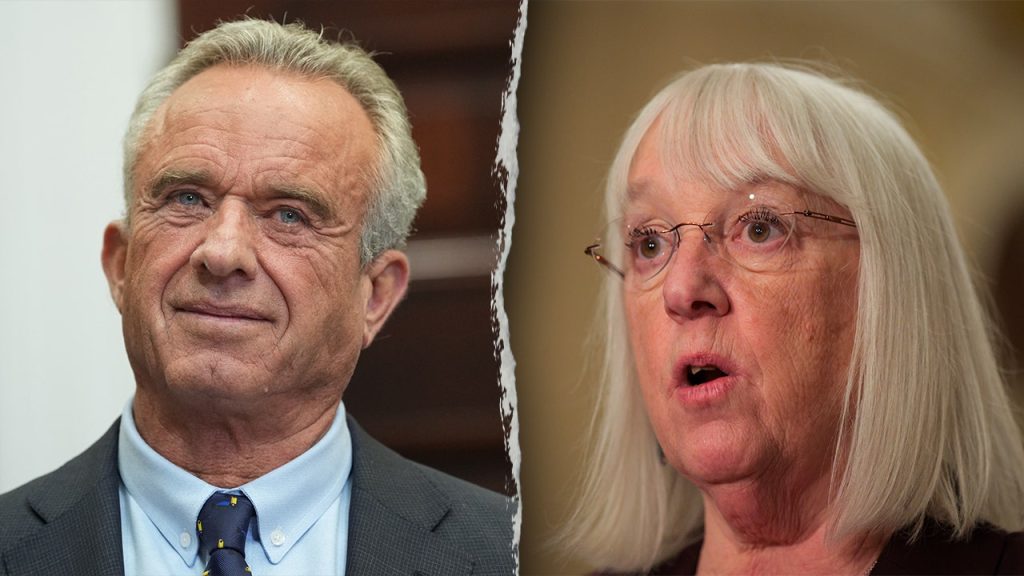In a recent Senate hearing, Health and Human Services Secretary Robert F. Kennedy Jr. criticized Washington Senator Patty Murray for what he described as years of neglect leading to the declining health of Americans. This exchange highlighted ongoing tensions between the two figures, reflecting deeper issues within U.S. health policy. Kennedy’s remarks reignited discussions on health care costs and access, making headlines as lawmakers face mounting pressure to address these critical areas.
| Article Subheadings |
|---|
| 1) Tense Exchange in Senate Hearing |
| 2) Kennedy’s Allegations Against Murray |
| 3) Historical Context of Health Care Debate |
| 4) Implications for Future Health Policies |
| 5) Public Reaction and Future Outlook |
Tense Exchange in Senate Hearing
During a Senate hearing on Tuesday, Robert F. Kennedy Jr. engaged in a heated exchange with Senator Patty Murray. This altercation was particularly notable as it underscored the stark differences in their viewpoints regarding health care in the United States. Kennedy directly accused Murray of overseeing a deterioration in public health, claiming, “You’ve presided over the destruction of the health of the American people.” The exchange, marked by its intensity, highlighted the long-standing frustrations related to health policy reform.
Kennedy’s Allegations Against Murray
Kennedy’s allegations were not without a backdrop of political rivalry. Over his 32 years in the Senate, Murray has been a prominent advocate for various health initiatives; however, Kennedy’s remarks reflect a growing dissatisfaction among some voters regarding the effectiveness of existing health policies. The essence of Kennedy’s argument revolves around the statistic that many Americans are among the unhealthiest globally, attributing this crisis to legislative inadequacies. “Our people are now the sickest people in the world,” Kennedy stated, emphasizing the urgency for reform.
Historical Context of Health Care Debate
The current tension between Kennedy and Murray is indicative of a broader historical debate concerning health care in America. Over the decades, numerous administrations have struggled to balance costs, access, and the quality of health services available to citizens. Significant legislative efforts, such as the Affordable Care Act, were aimed at expanding coverage, yet challenges persist. This extended history of disagreement fuels the current discourse and underscores the importance of continued dialogue among policymakers.
Implications for Future Health Policies
The sharp exchange between Kennedy and Murray raises critical questions about the future of health policy in the United States. As health care costs continue to rise and public health outcomes remain concerning, there is increasing pressure on lawmakers to act decisively. The outcome of this dialogue may significantly shape upcoming health initiatives, pushing for legislation that addresses not only affordability but also the quality of care that Americans receive. The repercussions of these discussions are expected to resonate through upcoming elections as constituents demand accountability on health matters.
Public Reaction and Future Outlook
The public reaction to the heated exchange has been mixed, demonstrating the polarized nature of the current political climate. Supporters of both Kennedy and Murray have taken to social media to voice their opinions, underscoring the divisive nature of health care reform. Many citizens are calling for immediate changes to existing health policies, reflecting concerns over rising health care costs and deteriorating health outcomes. As both parties prepare for future legislative battles, it is likely that health care will remain a top issue leading into the next election cycle.
| No. | Key Points |
|---|---|
| 1 | Kennedy criticized Murray for alleged failures in health policy over her decades-long Senate career. |
| 2 | Kennedy claims that Americans are among the unhealthiest in the world, a situation he ties to political decisions. |
| 3 | The exchange reflects longstanding frustrations surrounding U.S. health policy and care access. |
| 4 | Future health policies are under pressure to reform, particularly on costs and care quality. |
| 5 | Public opinion has become increasingly vocal regarding health initiatives as the election nears. |
Summary
The recent Senate hearing between Robert F. Kennedy Jr. and Patty Murray exemplifies the contentious debates surrounding health care policies in the United States. As the nation grapples with significant health challenges and escalating costs, the Legislative Assembly is under immense pressure to deliver viable solutions. The future implications of this exchange and broader public response are set to influence the ongoing discourse on health care reform leading into the next electoral cycle.
Frequently Asked Questions
Question: What were the main points raised by Kennedy during the Senate hearing?
Kennedy primarily focused on accusing Senator Murray of neglecting American health over her lengthy tenure in the Senate. He claimed that the U.S. population is among the unhealthiest globally, attributing this issue to failed policies.
Question: How has the public responded to the Kennedy-Murray exchange?
Public reaction has been polarized, with supporters of both sides voicing their opinions on social media. There is an evident urgency among citizens for immediate reforms addressing health care costs and accessibility.
Question: What are the implications for future health care policies?
The implications include potential shifts in health policy initiatives aimed at balancing costs and improving care quality, particularly as lawmakers face pressure from constituents leading into future elections.
